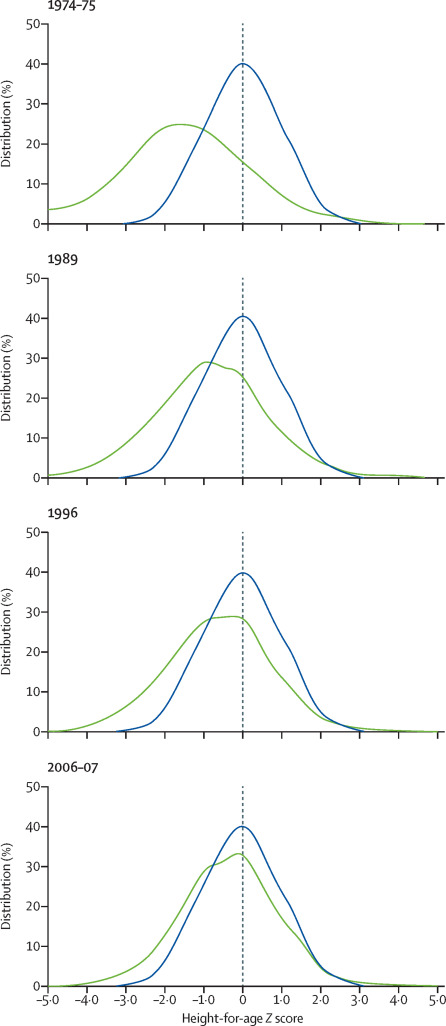当前位置:
X-MOL 学术
›
Lancet Global Health
›
论文详情
Our official English website, www.x-mol.net, welcomes your
feedback! (Note: you will need to create a separate account there.)
Population-level linear growth faltering in low-income and middle-income countries
The Lancet Global Health ( IF 19.9 ) Pub Date : 2017-12-01 , DOI: 10.1016/s2214-109x(17)30425-4 Jean H Humphrey , Andrew J Prendergast
The Lancet Global Health ( IF 19.9 ) Pub Date : 2017-12-01 , DOI: 10.1016/s2214-109x(17)30425-4 Jean H Humphrey , Andrew J Prendergast

|
Linear growth faltering or stunting among young children in low-income and middle-income countries remains a stubborn global health challenge. Postnatal stunting largely occurs between birth and 24 months of age when mean length-for-age Z score (LAZ) plummets from −0·5 to −2·0, with little change thereafter.1 Stunting influences all life stages, reducing survival in infancy,2 educational attainment in childhood,3 and economic productivity in adulthood.4 Moreover, offspring of adults who experienced linear growth faltering as children are at increased risk of stunting, creating an intergenerational cycle of reduced human capital.
中文翻译:

低收入和中等收入国家的人口水平线性增长步履蹒跚
低收入和中等收入国家的幼儿的线性增长步履蹒跚或发育迟缓仍然是全球健康的顽固挑战。出生后发育迟缓主要发生在出生至24个月之间,当时平均年龄Z评分(LAZ)从-0·5下降至-2·0,此后几乎没有变化。1发育迟缓会影响所有生命阶段,降低婴儿期的生存率,2降低儿童的受教育程度,3以及成年后的经济生产力。4此外,成年后代的线性成长步履蹒跚,而儿童的发育迟缓风险增加,从而造成代代相传的人力资本减少。
更新日期:2017-11-11
中文翻译:

低收入和中等收入国家的人口水平线性增长步履蹒跚
低收入和中等收入国家的幼儿的线性增长步履蹒跚或发育迟缓仍然是全球健康的顽固挑战。出生后发育迟缓主要发生在出生至24个月之间,当时平均年龄Z评分(LAZ)从-0·5下降至-2·0,此后几乎没有变化。1发育迟缓会影响所有生命阶段,降低婴儿期的生存率,2降低儿童的受教育程度,3以及成年后的经济生产力。4此外,成年后代的线性成长步履蹒跚,而儿童的发育迟缓风险增加,从而造成代代相传的人力资本减少。










































 京公网安备 11010802027423号
京公网安备 11010802027423号